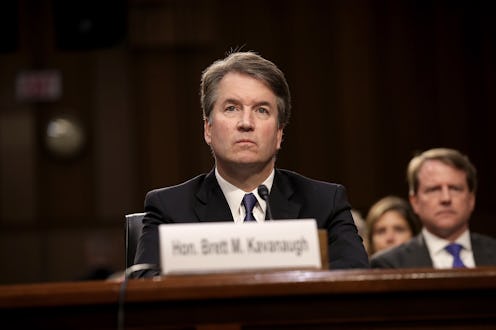News
Only 2 States Require Consent To Be Part Of Sex Ed — That Needs To Change

Through all of the coverage and commentary surrounding Christine Blasey Ford’s allegation of sexual violence against Supreme Court nominee Brett Kavanaugh (who denies the claims), one thing has become abundantly clear: We are doing a terrible job of teaching people about preventing sexual violence in this country.
The folks who quickly and easily dismiss survivors who speak up with arguments like, "this is just typical, drunk high school boy behavior," are missing an important point: Whether it happens sober or drunk, at age 15 or 55, sexual assault is still sexual assault. And the old adage "boys will be boys" is (and always has been) an unacceptable excuse.
But the thing is — many of these critics genuinely don’t take issue with the behavior that Ford describes. And while that is a huge problem, it’s not entirely surprising.
Right now in 2018, 31 states and the District of Columbia mandate sex education be taught in school. But, of those states, 21 have no requirements for accuracy or appropriateness of content. What's even worse is the fact that only two states (Maryland and California) currently require consent to be a part of sex education instruction.
It is fairly obvious that we need to do better when it comes to teaching young people about consent. What’s less obvious, but just as crucial, is the need to also teach about — and dismantle — rape culture, which has allowed sexual violence to go largely unchecked.
Changing an entire country’s culture is a tall order. But we already have a great starting point to do just that: comprehensive sexuality education.
Comprehensive sexuality education is consent education. And, beyond that, it helps to debunk myths and tackle harmful stereotypes that surround sex and sexuality — covering a range of topics like enthusiastic consent, gender roles, healthy relationships, and more.
In the era of #MeToo, it’s becoming increasingly clear that sexual violence affects all of our lives.
Comprehensive sexuality education is sequential, age-appropriate, and developmentally appropriate, starting in kindergarten and continuing through 12th grade. While some people might initially be taken aback by the notion of sex education for kindergarteners, it’s necessary.
People of all ages experience sexual violence. And harmful messages like "boys will be boys" start and stick when we’re young. If we want any hope for adequately addressing the epidemic of sexual violence in the United States, we need to start by talking about it more often, and earlier on.
Teaching five-year-olds about consent doesn’t have to be complicated. Educating children and young people early in their lives that they not only have the right to draw boundaries but also have to respect that same right for others creates a foundation upon which we can discuss sexual consent through adolescence and into adulthood.
Unfortunately, far too few school districts provide comprehensive sexuality education to their students, and many young people across the country barely receive sex education at all. If we don’t want this epidemic of sexual violence to continue, then it’s up to us to advocate for comprehensive sexuality education in classrooms in every school district across the United States.
The allegations against Kavanaugh are unfortunately not unique. In the era of #MeToo, it’s becoming increasingly clear that sexual violence affects all of our lives — whether experienced by our family, our friends, or ourselves.
It is easy to read a person’s tweet and tell them, "Your views are terrible." It is a lot more difficult to get them to unlearn everything they’ve ever learned over the years about sexual violence, consent, rape culture, masculinity, bodily autonomy, and so much more. It’s not impossible, but it is far from guaranteed.
So, let’s not take that chance. We owe it to our young people to work toward a world in which experiences like the one Christine Blasey Ford says she went through are not a regular occurrence. And if we want this world to become a reality, we need to start with prioritizing sex education.
Chitra Panjabi is the president and CEO of the Sexuality Information and Education Council of the United States.
This op-ed solely reflects the views of the author, and is part of a larger, feminist discourse.